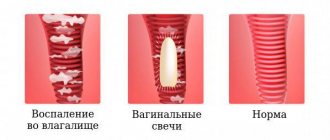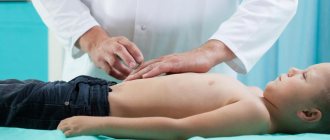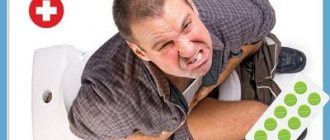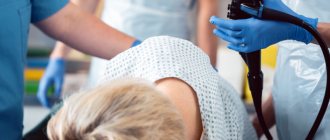Good afternoon, young mothers. Digestive problems during the postpartum period are very common. Almost all women at different stages of postpartum recovery are faced with the problem of loose stools after childbirth.
You should not ignore the problem during breastfeeding - it is dangerous for both mother and child.
But what is the reason for the appearance of loose stools after childbirth, what is the danger of this phenomenon and, most importantly, what can be done about it? Let's look at these questions below.
What are the dangers of loose stools after childbirth?
What is the danger of loose stools after childbirth? Everyone knows that after pregnancy and childbirth, a woman’s body is exhausted and weakened - it needs recovery.
But, in addition to this, there is another burden - breastfeeding!
To produce breast milk, many processes in the body are activated, and how healthy the female body is depends on how it will cope with this difficult task. The quality of breast milk determines the baby's health, normal growth and development.
But, diarrhea after childbirth can have a negative impact on this process. First of all, there is a danger of rapid dehydration of the body, which is simply unacceptable during breastfeeding.
In addition, diarrhea after childbirth slows down the recovery process, as the digestion of food deteriorates, and with it the absorption of essential nutrients. Because of this, the quality of milk decreases significantly, which means that the child does not receive many nutrients.
What to do about diarrhea during pregnancy and how to prevent dehydration
Most often, doctors prescribe over-the-counter medications for diarrhea during pregnancy. In some cases, patients with dehydration are given intravenous fluids. If you have diarrhea in pregnant women, you should drink water more often and call a doctor at the first signs of dehydration, such as:
- strong thirst;
- dry lips and skin;
- rare or absent urination;
- dark colored urine;
- feeling tired, weak, dizzy.
Causes of loose stools after childbirth
Diarrhea after childbirth can have a variety of causes. To eliminate loose stools, it is important to first understand the cause of the problem. After all, the choice of treatment method depends on the cause. And qualified treatment is very important.
Products that will help eliminate loose stools after childbirth - reviews from a mother who has ever used them - should not be used when choosing them. After all, the reasons may be different, which means that the doctor must select treatment methods individually.
- The first and most common cause of diarrhea after childbirth is a violation of the natural intestinal microflora. Before giving birth, a woman always gives herself an enema, or it is performed by doctors at the preparatory stage. Because of this, the acid-base balance and intestinal microflora are disturbed, and it takes time to restore it. Also, in some cases, after childbirth or cesarean section, a course of treatment with antibiotics is carried out, which destroy not only pathogenic, but also “good” bacteria. This leads to disturbances in the digestive process and provokes diarrhea, and sometimes constipation.
- The second reason for the appearance of loose stools after childbirth is a violation of intestinal motility due to a decrease in smooth muscle tone. This happens due to impaired blood supply to the pelvic organs during pregnancy. But, as a rule, loose stools after childbirth quickly return to normal in this case.
- The problem is much more serious if the cause of diarrhea after childbirth is a bacterial infection. Unfortunately, today in medical institutions the sanitary condition does not always correspond to accepted standards, and quite often it is in the maternity hospital that a woman becomes infected. But intestinal infections can also be a consequence of non-compliance with hygiene requirements on the part of the woman herself. In this case, it is necessary to very urgently treat the infectious disease and try to reduce contact between the mother and the child in order to protect him from infection.
- Another reason for loose stools after childbirth may be a food allergy or intolerance to some type of food. Therefore, during breastfeeding, you should not go for culinary experiments - this can harm not only you, but also the baby you are feeding with breast milk.
- In some cases, due to hormonal imbalances during the postpartum period, diarrhea may be the result of an enzyme deficiency. In this case, appropriate treatment is prescribed.
Prevention of atony in the postpartum period in nursing mothers
Many women, both during pregnancy and immediately after the birth of a child, experience problems with bowel movements. reasons contribute to this
: a fairly sharp change in the hormonal background of a young mother, a gradual displacement of the intestines in the abdominal cavity to their original place, despite the remaining pressure of the uterus, weakened and stretched muscles of the abdominal press and perineum, fear of straining due to sutures (imposed in case of cesarean section, episiotomy, ruptures ) and hemorrhoids, an irrationally selected diet, psychological stress associated with caring for a child and a new family status, congenital features of the intestine, for example, elongated sections.
It is advisable to consume foods
, which are natural mild laxatives, are well-known to everyone: muesli, buckwheat, millet and pearl barley, oat bran, black bread, vegetable oils, fresh and cooked vegetables and fruits (carrots, beets, pumpkin, zucchini, spinach, lettuce , broccoli, cabbage, dried fruit compotes, melon, apples, apricots, cherries), fermented milk products.
The body of every woman, especially a breastfeeding woman, is individual. One woman may even benefit from a glass of warm water in the morning. Avoid drinking
strong tea, polished rice, coffee, semolina, white bread, wheat bran, blueberries, quince, pears, currants, strawberries, legumes, walnuts, hard cheese, crackers, chips. These products help slow down peristalsis.
Laxatives
It should not be used by young mothers who are breastfeeding. Since, firstly, it will penetrate into breast milk, and from there into the baby’s body and will most likely cause abdominal pain and diarrhea in the baby, and secondly, laxatives can cause addiction, which subsequently requires an increase in the dose of the laxative. Place one hand on the right iliac zone (right, lower abdomen) and begin to slowly move up to the right hypochondrium, move to the opposite iliac zone. Start with slow stroking, gradually intensifying them and adding slightly pressing, rubbing movements. The procedure is completed with light tapping and stroking.
Physical exercise is an excellent way to stimulate intestinal motility and normalize digestion.
.
The work of a mother cannot be underestimated, but fatigue in the first months after childbirth is not so much physical as psychological, everyday due to lack of sleep, from various worries and simply from detrained muscles, which gradually arose during the last months of pregnancy. The very next day after birth and beyond, you can perform exercises to prevent stagnation in the intestines (the basis of the exercises is relaxation and tension of the abdominal and perineal muscles, cross movements, twisting movements)
:
- Lying on your back, arms along your body, legs bent at the knees, take a deep breath and inflate your stomach, hold your breath a little and exhale forcefully through your mouth, while trying to pull in your stomach as much as possible. Repeat 4-8 times.
- Lying on your back, arms along your body, legs bent at the knees. Inhale and tense your pelvic floor muscles, hold your breath slightly, exhale and relax. Repeat 4-8 times.
- The starting position is the same. Simultaneously with inhalation, lift your right leg and left arm up, and while exhaling, lower it. Repeat with left leg and right arm. Repeat 4-8 times.
- Standing, feet shoulder-width apart, arms extended forward. Without lifting your legs, turn your body to the right, moving your right arm back as far as possible, inhale. Return to the starting position, exhale. Repeat on the other side. Perform the exercise several times.
- Standing on all fours, while inhaling, draw in your stomach and perineum, hold your breath for a couple of seconds, and exhale, relax. Repeat.
- Lying on your back, alternately bring your leg bent at the knee and hip joints to your stomach.
The flight of creativity and imagination is not limited! You can invent several exercises for yourself that are comfortable to perform.
Have an easy birth!
Tags: fitness during pregnancy
How to restore stool after childbirth
It is advisable to solve the problem of loose stools after childbirth as soon as possible in order to avoid negative consequences such as dehydration, intoxication, and exhaustion.
It is very important to understand that in a single case of loose stool after childbirth, there is nothing abnormal, but only if everything returns to normal afterwards.
But, if diarrhea occurs more than three times a day, you should immediately consult a doctor. The speed of treatment depends on the speed of treatment.
Self-medication during breastfeeding can end very badly for you and your baby. Let's look at what treatment for diarrhea during the postpartum period might look like.
- If an intestinal infection occurs, it is necessary to determine the type of bacteria; for this purpose, feces are tested and an antibiotic is prescribed to which the identified microorganisms are most sensitive. In addition, auxiliary medications may be prescribed to normalize intestinal function. In this case, depending on the type of problem, breastfeeding may not continue. But it is possible to maintain lactation - there are ways, be sure to consult a doctor about this, because the best, healthiest and most delicious food for a child is mother’s breast milk.
- If a nursing mother is diagnosed with diarrhea, it is imperative that she be given an appropriate diet. You should also consult your doctor about changes in diet, as this requires an individual approach and taking into account many nuances.
- In order to slow down intestinal motility, a woman may be prescribed antispasmodics. They also relieve pain in the abdominal area. This will not help completely eliminate the mother’s loose stools after childbirth, but it will make recovery easier.
- In order to help speed up the restoration of normal stool, astringent and enveloping drugs are also prescribed.
- If diarrhea was caused by a violation of the natural intestinal microflora, drugs must be prescribed to restore it.
The dangers of diarrhea while breastfeeding
Diarrhea is more dangerous for the mother than for the baby
Often mothers think that the main danger of diarrhea is the risk of infection of the child and interruption of breastfeeding. But modern medicine adheres to the point of view that diarrhea poses a greater danger to the mother than to the child, and breastfeeding can be done even with an intestinal infection. Infections are transmitted through unwashed hands, and not through milk, and food poisoning does not need to interrupt breastfeeding for the reason that, along with a small dose of toxins, the child also receives the mother's antibodies to the infection.
In case of a viral infection and a significant deterioration in the mother’s condition, the doctor may advise stopping breastfeeding for a short time, but there is no need to completely switch the baby to formula. Diarrhea is more dangerous for the mother, because she always needs to have strength to take care of the child. If mom suffers from diarrhea, eats poorly, sleeps poorly and is stressed, her milk supply may decrease. The most dangerous consequence of diarrhea is dehydration. The body loses water, vitamins and microelements that it needs for normal functioning.
With infrequent and mild diarrhea, the harm caused to the body is small, but with chronic and severe diarrhea, you need to sound the alarm, consult a doctor and get treatment. It is very important to stop fluid loss. If the body loses 10% of water, quite serious disorders begin, severe exhaustion, weakness, lethargy. When 25% of water is lost, death occurs.
Bloody diarrhea is very dangerous. He requires immediate hospitalization. The so-called “black stool” mixed with blood is a sure sign of intestinal bleeding. Under no circumstances should you try to stop it yourself; you cannot do without medical help.
Severe and prolonged diarrhea (more than 3 days) can lead to shock. Symptoms of shock include cold sweat all over the body, dizziness, rapid pulse, and severe weakness. In this case, you also need to call an ambulance.
Folk remedies for loose stools after childbirth
A young mother should remember that not all folk remedies can be used for diarrhea during breastfeeding. Therefore, it is worth agreeing with your doctor about all the traditional methods of treatment you like.
Traditional medicine is best used as an aid to speed up recovery and naturally support the body. Let's look at folk remedies for diarrhea after childbirth.
- To prepare this remedy you will need a glass of rice, 3 liters of water, a pinch of soda and a bay leaf. Throw everything into an enamel pan and cook for 30 minutes. Throw in the soda at the very end of cooking. Then strain and drink the liquid in a glass every 2-3 hours.
- A very effective way to restore stool is to use chokeberry compote, juice or tincture. But, it is not recommended to use it while breastfeeding, as it can lead to constipation in the baby.
- A strong decoction of chamomile and yarrow helps relieve inflammation and restore the functioning of the enzymatic system and eliminates loose stools after childbirth.
- Many people save themselves from diarrhea with thick blueberry jelly, but only without sugar, as it promotes the growth of bacteria.
- Homemade low-fat sour milk mixed with a pinch of soda and salt helps to quickly restore intestinal function.
- Boil chicken eggs for at least 10 minutes, mash the yolks (3 pieces) with a fork, add a spoonful of starch and a little boiled water. Eat a tablespoon before meals 3 times a day.
Remember that loose stools after childbirth pose a threat to your body and deplete it. Remember to drink plenty of fluids and practice good hygiene to avoid spreading the disease.
Follow your diet and all your doctor's recommendations and you will get better very soon!
Did you like the article? Share with friends on social networks:
Diarrhea in early pregnancy
Diarrhea itself is not an early sign of pregnancy. However, in the first trimester, loose stools during pregnancy and other digestive disorders are quite likely.
In the early stages of pregnancy, the body undergoes many transformations, which can also affect digestion, such as causing constipation or diarrhea. In particular, an increase in the level of the hormone progesterone in the blood often slows down the digestion process and leads to constipation.
Changes in diet during pregnancy can also lead to digestive problems. For example, diarrhea during pregnancy can result from eating too much fiber, and taking prenatal vitamins can often affect stool frequency and consistency.
Eating foods rich in fiber, such as fruits, vegetables and grains, can often help relieve constipation, but can also cause bloating, cramps or diarrhea if changes in diet are too drastic.
Sometimes, to solve both problems, it is recommended to drink more water - this helps with constipation and restores the body from dehydration caused by diarrhea. If you are concerned about digestive problems early in pregnancy, such as bloating or diarrhea, consult your doctor.
And if in the early stages you are interested in knowing when approximately the baby will be born, use our due date calculator.








